Share
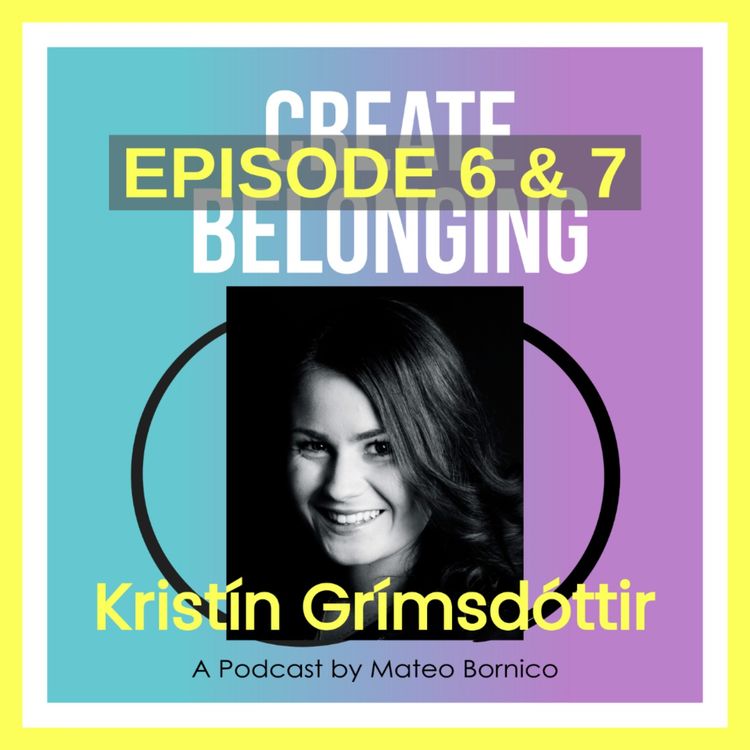
Create Belonging
7 - Kristín Grímsdóttir and Her Path to Authenticity
•
Welcome to Part 2 of our conversation with Kristín Grímsdóttir . This is the follow-up episode where the conversation starts exploring the topic of Authenticity. Naturally, this conversation offers a very personal look at Kristín’s own story with authenticity. She offers some practical insights on how she experiences authenticity with herself and with others.
We are extremely grateful for Kristín’s vulnerability in talking about her journey to find her belonging.
In this Episode one we cover the following topics:
- Kristín’s path to authenticity, starting from a small fishing village in Iceland
- The early days of living up to external expectations were the antithesis of living authentically
- How this one TED talk changed her forever
- Her 12-year journey of living from vulnerability to authenticity
- The slow, tough, and uncomfortable journey of living in vulnerability
- Trusting the process, and taking risks in big life decisions - following the feeling
- How to identify authenticity in others - “It’s a feeling in your body”
- Helping others discover their values and live more authentic lives
- Her approach to helping her children discover and live in accordance with their values
- Understanding your values and your energy has an effect on other people
- How living authentically can help one take responsibility for one’s actions
- What Create Belonging means to Kristín
If you haven't already, I highly recommend giving this episode a listen to gain valuable insights into living a more authentic life. Tune in now to Create Belonging, available on your favorite podcast platforms.
More episodes
View all episodes
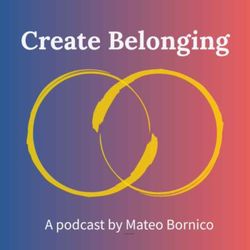
13 - The 3 Dimension of Belonging
31:42|The 3 Dimensions of Belonging: A Framework for Understanding How We ConnectBelonging is one of those catch-all terms that everyone talks about, but we're often describing completely different experiences. On this episode, Mateo explores a framework that breaks belonging into three distinct dimensions - not as a prescription to follow, but as a compass for understanding the different ways we can experience connection.What Mateo Covers:The three dimensions of belonging: Self, Others, and UniversalWhy most conversations about belonging get stuck focusing on just one dimensionHow belonging with yourself creates space for more authentic relationshipsThe science behind our innate connection to nature and something larger than ourselvesWhy exclusion registers in our brains the same way physical pain doesHow to use these dimensions as pathways when you're feeling disconnectedThe Venn diagram approach: mapping the seven different states of belongingKey Ideas Explored:Brené Brown's True Belonging and what it means to stand alone in the wildernessThe biophilia hypothesis and why we're wired for nature connectionUbuntu philosophy: "I am because we are"How authenticity and social connection can sometimes work against each otherWhy these dimensions aren't hierarchical - just different landscapes to exploreResources: Mateo has created a free Venn Diagram PDF mapping out all seven belonging states, complete with research notes and book recommendations. Reach out at createbelonging@gmail.com or connect on LinkedIn to get your copy.This isn't about optimizing your belonging or checking boxes. It's about recognizing the different pathways that are always available and learning to trust your own internal compass.Enjoying these conversations? Please subscribe, rate, and review wherever you're listening - it helps more people discover these explorations of belonging and connection. Thank you for being part of this community and for doing the work of creating belonging for yourself and others.Acknowledgments:Music “Playing with Color” by Nullhertz obtained royalty-free from PixabayThank you to the lovely people at Purple Space for your support——————————-Thank you for listening! I would love your Feedback: Please send me an email at createbelonging@gmail.com and let me know what you thought of the episode. You can also follow us on Instagram: https://www.instagram.com/createbelonging/ or on Linkedin: https://www.linkedin.com/company/create-belonging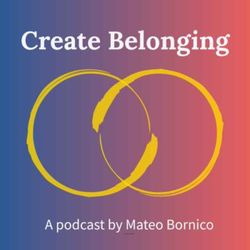
Short Update - We're Back!
05:24|After nearly two years away, I'm back! This is a short update on where I've been. I stepped away to work on my mental health, handle professional commitments, and wrestle with procrastination and imposter syndrome.During this time, I've learned that sometimes stepping back is necessary, and that belonging to yourself comes first. I've also been thinking about what Create Belonging can offer in a world where anyone can start a podcast and AI generates content instantly.I'm returning not with a polished plan, but with curiosity and the same commitment to exploring what it means to truly belong. The format might evolve, but the core mission remains: creating space for authentic conversations about belonging.Ready to continue this conversation about belonging? Subscribe to Create Belonging wherever you listen to podcasts, and join a community committed to exploring what it truly means to belong in this world.Acknowledgments:Music “Playing with Color” by Nullhertz obtained royalty-free from PixabayThank you to the lovely people at Purple Space for your support——————————-Thank you for listening! I would love your Feedback: Please send me an email at createbelonging@gmail.com and let me know what you thought of the episode. You can also follow us on Instagram: https://www.instagram.com/createbelonging/ or on Linkedin: https://www.linkedin.com/company/create-belonging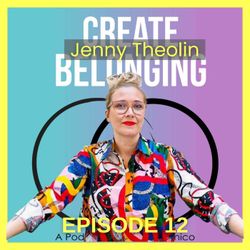
12 - Dare to Belong with Jenny Theolin
57:45||Season 12For Episode 12 of Create Belonging - we explore CREATIVITY and FACILITATION with Jenny Theolin. Did you know that creativity is one of the keys to finding your belonging?Creativity is about taking what we know, what we imagine, and what surrounds us and making something significant, something that may not have existed otherwise. We all have the potential to be creative and, in many ways, creativity is something that is deeply human and something that requires action and courage. If we are trying to discover our belonging or if we are trying to help others belong, then creativity is one of the necessary skills that one will need. And when it comes to understanding how creativity can be used for belonging, I knew I wanted to speak to Jenny Theolin. Jenny Theolin is a renowned expert who helps people learn more effectively. Calling upon her wealth of experience from around the world and background in design, she creates effective, engaging, and memorable learning experiences for organisations, schools, and non-profits.Jenny grew up as a world citizen, where she developed a high cultural intelligence and understanding of the humanity that connects us all. This conversation explores the power of facilitation and how this skill is often overlooked. Jenny’s latest book is “Dare to Facilitate” a collaboration with expert facilitators sharing their insights on how to properly embrace facilitation as the skill that helps individuals and companies collaborate better and tap into people’s true potential. This was a very FUN, insightful, and generous conversation with a creative human who creates belonging in all her projects. I was inspired by this conversation, and I hope you too will be inspired. Resources to continue exploring:Jenny’s personal website, Instagram, X, LinkedInStudio Theolin’s websiteHer New Book “DARE TO FACILITATE” book websiteDownload: “How to be an Alien” by George Mikes (1946) inspired one of Jenny’s previous art show called “Alienation”. You can download the full book in PDF here. Elizabeth Gilbert on Distinguishing Between Hobbies, Jobs, Careers, & Vocation from Acumen Academy YoutubeSupport Create Belonging:Subscribe on iTunes or Spotify.Get in touch and Please send us your feedback: www.createbelonging.com/contact Share this episode with a friend!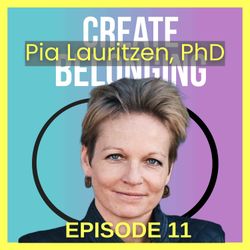
11. 11 - Questions, Curiosity and Belonging with Pia Lauritzen PhD.
40:41||Ep. 11Pia Lauritzen, Ph.D. is a philosopher whose body of work revolves around uncovering the nature of questions and why they may just be more powerful than one may think.Indeed, questions are everywhere, and yet few of us know just how powerful they can be in changing our world. “We know that after a question is asked, the world may never be the same afterward”. Pia Lauritzen Ph.D.Pia is also someone who believes all questions are valid, and that we shouldn’t put too much emphasis on asking questions for the sake of getting answers - rather, we should just look into what the question is trying to tell us. This was a jam-packed, condensed conversation with a wonderful, insightful, and thoughtful human. I hope you enjoy this episode, and please don’t forget to connect with Pia Lauritzen on LinkedIn, and check out her upcoming book published with John Hopkin’s University Press. Resources to continue exploring:Pia's LinkedIn Pia’s book published on John Hopkins University Press: Question: A Brief Book about Big Ideas Pia’s Blog: Pia’s Questions Pia’s free tool for education and educators: Question Jam Pia’s consulting tool for companies to tap into the power of questions: qvest.io Support Create Belonging:Subscribe on iTunes or Spotify. Get in touch and Please send us your feedback: www.createbelonging.com/contact Share this episode with a friend!Acknowledgments:Music “Playing with Color” by Nullhertz obtained royalty-free from PixabayThank you to the lovely people at Purple Space for your support——————————-Thank you for listening! I would love your Feedback: Please send me an email at createbelonging@gmail.com and let me know what you thought of the episode. You can also follow us on Instagram: https://www.instagram.com/createbelonging/ or on Linkedin: https://www.linkedin.com/company/create-belonging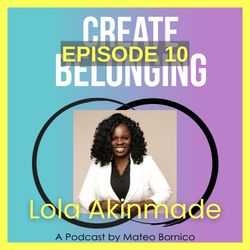
10. 10 - Lola Akinmade Akerstrom: Exist without explanation
51:34||Season 0, Ep. 10Welcome to Episode 10 of Create Belonging. I sit down and talk with the amazing Lola Akinmade about her life, work, books, and her views on Belonging in a world that tries to put you in a box. I loved this conversation and I hope you do too. Show NotesKey ideas we explore in this episode:From Programmer to Photographer: Lola’s incredible range of experienceLola’s concept of home: “A Space where I can exist without explanation” where one is celebrated for just “existing”, without judgment. Why she doesn’t believe in first impressions. She tried not to judge anyone until after 10 minutes. Instead, we should look for depth in people. How the Swedish concept of Lagom works as a personal value but fails as a societal rule. We discuss the importance of being a role modelTokenism - how it can be done right, and when should we call companies out? The responsibility of opening the doors for others. Resources to continue exploring:Lola's Homepage and Blog. Lola’s Tedx TalkLola follows the examples of some very prominent Nigerian Authors: https://en.wikipedia.org/wiki/Chimamanda_Ngozi_Adichie Lola’s Slate Article on Lagom: “Why are Swedes so Quiet”Book: Lagom: The Swedish Secret of Living Well - the book that was published in 18 different languages, except in Swedish! Trevor Noah’s final thoughts and highlighting the importance of honoring black women Book: In every Mirror She’s Black and Sequel Everything is not enoughSupport Create Belonging:Subscribe on iTunes or Spotify.Get in touch and Please send us your feedback: www.createbelonging.com/contactShare this episode with a friend!Acknowledgments:Music “Playing with Color” by Nullhertz obtained royalty-free from PixabayThank you to the lovely people at Purple Space for your support——————————-Thank you for listening! I would love your Feedback: Please send me an email at createbelonging@gmail.com and let me know what you thought of the episode. You can also follow us on Instagram: https://www.instagram.com/createbelonging/ or on Linkedin: https://www.linkedin.com/company/create-belonging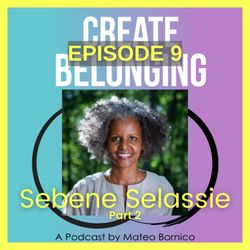
9. 9 - Sebene Selassie PART 2
36:18||Season 2, Ep. 9Welcome once again to Part 2 of my conversation with writer and meditation teacher Sebene Selassie. While part 1 was all about how we belong first and foremost to ourselves, this second part is about belonging with others. We start the conversation by talking about the illusion of power dynamics in society. Sebene flips the script that society is a struggle towards the middle where there is access to resources and power. She does that by reminding us that those in the margin - have a richness of perspective and access to fluidity and other ways of belonging that those in the middle might not. This part two of the conversation was a lot more personal and open, and one where I really got to express my deep gratitude for Sebene’s contribution to our understanding of Belonging. Key ideas we explore in this episode:Get into Power dynamics - and how we have the idea that society is structured in concentric circles where the Powerful stand in the middle, holding onto power and status. While those in the margin have a richness of perspective and a more holistic view based on a deeper knowledge of understanding. Context Switching - Fluency vs Semeiotic Vigilance - and why this can lead many of us to fatigue of belonging. And how Affinity Groups can offer minorities some respite from constantly being “Vigilant and monitoring” whether we belong or fit in. We look into the efficiency of Affinity groups - like female only, on black only groups. And how they create the space for much of the “work” that can be done so that the conversations and the network can be explored in a more profound and direct way. She answers the questions about her vision of the future with “how she would like to feel in that future”, and gives us some clues on the type of world we should all be striving towards. And much more…Resources to continue exploring:The ideas and media related to this episodeWikipedia on “From Margin to Center” - by Bell Hooks Sebene’s book You Belong: A Call for Connection Subscribe to Sebene’s newsletter Follow Sebene on Instagram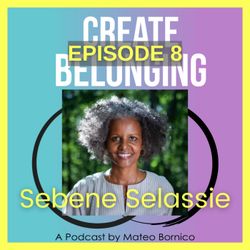
3. 8 - Sebene Selassie
39:45||Season 2, Ep. 3“Belonging is TRUE, it’s not up for debate, it’s a fundamental fact that we all belong to everything” - Sebene SelassieWelcome to Part 1 of the long-awaited interview with writer and meditation teacher Sebene Selassie. We introduce her book “You Belong - A Call for Connection” and her motivations for writing it. We discuss the fundamental fact of belonging and the paradox of belonging.We later go on to look at the way that the world seems to be suffering from a “Delusion of separation” and how the way to wake up from that reality is to look inwards. This was a very rich, insightful, and enlightening conversation about belonging with one of the world’s leading thinkers on the matter. Key ideas we explore in this episode:How her book is not a map to belonging, but rather a “map key” where each one of us is expected to make our own maps. The Paradox of two truths: Even though we are not separate, we are not the sameThe delusion of separation: forgetting that we are all interconnected and part of the same realityWe touch on some of the systemic issues that have led us to forget the fundamental truth of belonging‘Mana’ the comparative mind and how it keeps ups in the delusion of separationWhy we must start with grounding ourselves BEFORE we can begin to know ourselvesHow cultivating “embodied awareness” can help us find our way back to belongingAnd much more…Resources to continue exploring:The ideas and media related to this episode:Hurry Slowly interview with Sebene on the Delusion of SeparationSebene’s book You Belong: A Call for ConnectionSubscribe to Sebene’s newsletterFollow Sebene on InstagramAcknowledgmentsMusic by Ergy, aka Hugues Coudurier, Facebook——————————-Thank you for listening! I would love your Feedback: Please send me an email at createbelonging@gmail.com and let me know what you thought of the episode. You can also follow us on Instagram: https://www.instagram.com/createbelonging/ or on Linkedin: https://www.linkedin.com/company/create-belonging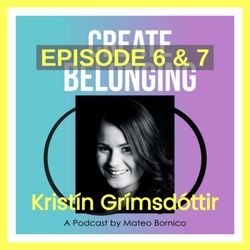
6. 6 - Kristín Grímsdóttir PART 1
23:49||Ep. 6For this episode, we sit down with the amazing and wonderful Kristín Grímsdóttir for a two-part conversation where we bridge Belonging with Authenticity. Part one starts with a discussion on the book "You Belong" by Sabene Selassie. During the podcast, Kristin shares her insights on what belonging means to her and how it ties into the work she has been doing for the past 15 years. She is an expert in helping others discover their authentic selves and use that awareness to empower their lives. In this Episode one we cover the following topics:How we should think of identity as flowing and how one wears many hats (5:00)Why “You Belong” by Sebene Selassie is the first book she starts and finishes in a long time (7:25)Why belonging is not connected to a place (9:45)How Biking she never felt lonely despite the fact that she traveled solo on a bike across Europe for 120 days (10:14)How acceptance and sensing ourselves can lead us to realize that we already belong (11:25)How Belonging can be a compass to authenticity (13:50)The two types of Belonging: individually and universally (15:25) How disconnection and not-belonging are hurtful (17:20)The opposite of Belonging is to “Fit-in” (17:45) How we should lean into the pain of feeling like not belonging and it can give us clues to our values (20:00) Kristín talks about the work she is doing with building tools to help people better understand themselves (21:00)Short Bio:Kristín Grímsdóttir has lived many lives. She is guided by her values, which one day led her to quit her job and cycle solo across Europe for over 120 days. She planned to meet over 100 strangers, and this lead her to write a memoir about the experience in the book “Real: a story I tell myself and choose to believe.” Aside from being an adventurer, she is also a mother, partner, and entrepreneur. She is a sustainability and leadership expert with over 15 years of experience in understanding human behavior and decision-making within the context of sustainability. She has been a startup founder and CEO, a project manager in a public company, and has led the sustainability agenda during digital transformation times in a large, international company. Kristin's passion for creating enabling conditions for sustainable development through vertical development has led her to specialize in conscious leadership, emotional intelligence, building trusted relations, strategy, sustainable business design, sustainable development, vertical development, culture and values, brand development, facilitation, project management, coaching, deep and genuine listening, co-creation, and navigating complexity.